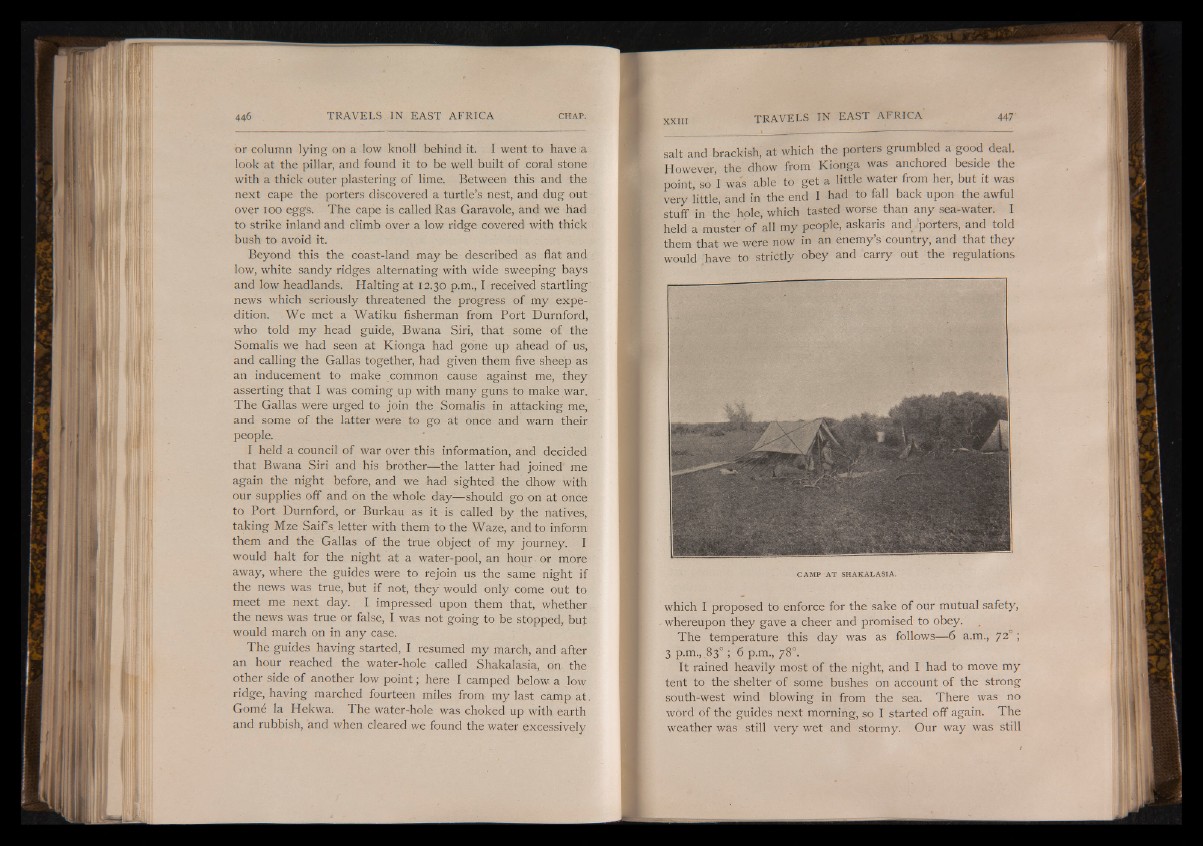
or column lying on a low knoll behind it. I went to have a
look at the pillar, and found it to be well built of coral stone
with a thick outer plastering of lime. Between this and the
next cape the porters discovered a turtle’s nest, and dug out
over 100 eggs. The cape is called Ras Garavole, and we had
to strike inland and climb over a low ridge covered with thick
bush to avoid it.
Beyond this the coast-land may be described as flat and
low, white sandy ridges alternating with wide sweeping bays
and low headlands. Halting at 12.30 p.m., I received startling'
news which seriously threatened the progress of my expedition.
We met a Watiku fisherman from Port Durnford,
who told my head guide, Bwana Siri, that some of the
Somalis we had seen at Kionga had gone up ahead of us,
and calling the Gallas together, had given them five sheep as
an inducement to make common cause against me, they
asserting that I was coming up with many guns to make war.
The Gallas were urged to join the Somalis in attacking me,
and some of the latter were to go at once and warn their
people.
I held a council of war over this information, and decided
that Bwana Siri and his brother— the latter had joined me
again the night before, and we had sighted the dhow with
our supplies off and on the whole day— should go on at once
to Port Durnford, or Burkau as it is called by the natives,
taking Mze Saif s letter with them to the Waze, and to inform
them and the Gallas of the true object of my journey. I
would halt for the night at a water-pool, an hour , or more
away, where the guides were to rejoin us the same night if
the news was true, but if not, they would only come out to
meet me next day. I impressed upon them that, whether
the news was true or false, I was not going to be stopped, but
would march on in any case.
The guides having started, I resumed my march, and after
an hour reached the water-hole called Shakalasia, on. the
other side of another low point; here I camped below a low
ridge, having marched fourteen miles from my last camp at.
Gomd la Hekwa. The water-hole was choked up with earth
and rubbish, and when cleared we found the water excessively
salt and brackish, at which the porters grumbled a good deal.
However, the dhow from Kionga was anchored beside the
point, so 8 was able to get a little water from her, but it was
very little, and in the end I had to fall back upon the awful
stuff in the hole, which tasted worse than any sea-water. I
held a muster "of all my people, askaris and porters, and told
them that we were now in an enemy’s country, and that they
would have to strictly obey and carry out the regulations
CAMP A T SHAKALASIA.
which I proposed to enforce for the sake of our mutual safety,
whereupon they gave a cheer and promised to obey.
The temperature this day was as follows— 6 a.m., 72° !
3 p.m., 83°; 6 p.m., 78°.
It rained heavily most of the night, and I had to move my
tent to the shelter of some bushes on account of the strong
south-west wind blowing in from the sea. There was no
word of the guides next morning, so I started off again. The
weather was still very wet and stormy. Our way was still